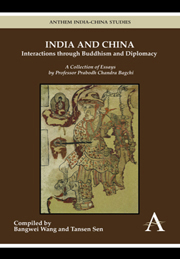 India and China: Interactions through Buddhism and Diplomacy
India and China: Interactions through Buddhism and Diplomacy Book contents
Indian Sciences in the Far East
from Part Two - Short Articles
Published online by Cambridge University Press: 05 March 2012
Summary
Science was international in ancient times as now but while in modern times the transmission of knowledge from one part of the world to the other is quick, in ancient times it was a slow process. Nevertheless the progress of knowledge depended then as now on the co-operation of diverse nations. It is well known that scientific notions in astronomy and medicine were developed by the ancient Egyptians and the Chaldeans but with the fall of Babylon in 539 B.C. it was the Greeks and not the Persians who took up the tradition. The Greeks henceforth went on perfecting the knowledge and building up what is known as the Greek science.
In India the Vedic Aryans had developed a scientific knowledge in identical branches (astronomy, mathematics and medicine) between 2000 and 600 B.C., the period during which the Babylonian science was also developed. The Vedic literature mentions the star-gazers (nakṣatradarśa), calculators (gaṇaka) etc. Already in the period of the Ṛgveda, the year was a solar year of 360 days and a quinquennial cycle with an intercalary month had been elaborated. Twenty-seven or twenty-eight lunar zodiacs (nakṣatras) and the phases of the moon also were known. The planets came to be discovered slightly later in the Āraṇyaka period about the 8th century B.C.
- Type
- Chapter
- Information
- India and China: Interactions through Buddhism and DiplomacyA Collection of Essays by Professor Prabodh Chandra Bagchi, pp. 191 - 198Publisher: Anthem PressPrint publication year: 2011


